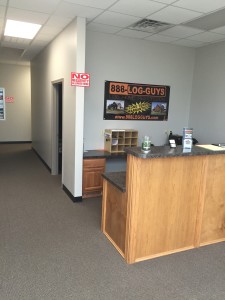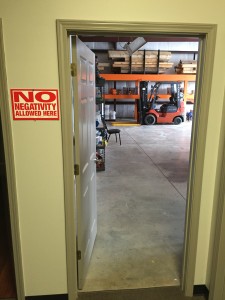
My good friend Grant Cardone gave me the idea to write on this, when he explained what “no negativity” meant to his organization. I felt I should share what it means to us.
First, what it doesn’t mean: I had a friend come to our office and say, “Jon! By saying ‘no negativity is allowed here’ your employees will be wary of voicing any complaints!” That is NOT what we mean when we demand no negativity.
For us, when it comes to worksite execution, customer service, and inter-work relationships, “no negativity” has become paradigmatic. It is the law upon which everything else in our company is based.
Specifically, there are FIVE ways in which this shapes us:
1. Negativity is not helping people that need help. Our answer is always, “Yes, we can do that!” to any request made of us. We drill this into our team any chance we can get. People always have unique requests that we may not understand. We’ve had clients ask us not to work at certain times so that their dogs could nap. We have had clients that didn’t want to speak in person and would stand inside their home and text/call us. They simply had some socially-unique requirements. One time,we had a client representative refer to the client by about ten different names, and when we finally asked why, it was because they had Secret Service protection. Okay! There are infinite reasons why people may have unique requests, and our job is to give you every single thing you want.
Sure, this has to be equitable. But know this: People won’t remember the way their house looks five years from now, or the way the food tasted five years from now…but what they WILL remember is how you made them feel, and whether you respected them.
2. Negativity is to not take full responsibility. We teach our team — from the top (me!) to the bottom — to take responsibility for EVERYTHING. Important note: Taking responsibility is NOT simply saying you are sorry (although this may indeed be a part of it). Taking responsibility is a commitment to solve a problem. If a client calls and asks to speak to me and they tell me there is some trash laying on the ground at their home, I take full responsibility for that. And I deal with it by calling the person onsite, immediately. Just so, if a client was to tell one of our Production Managers that they’d really like to speak to the owner but they cannot get a hold of me, my PM will say: “Mr. Smith, I take full responsibility for that. I will solve this problem for you.” And they will move heaven and earth to get a hold of me and MAKE SURE I reach out to the client. Every person in our company is empowered to take responsibility — and solve! — literally any problem.
Try this in your organization! “That isn’t my department,” or “Let me get you to customer service” is antiquated and not the way business works in 2016. The greatest gift you can give your client is TIME. Give them time by taking responsibility and, once you’ve said, “I’ve got this for you,” that needs to be as good as gold.
3. Negativity is to not be solutions-minded. Look: Things go wrong. If you tell me you’ve never had a bad customer relationship or never had a negative BBB complaint, all that tells me is that you are new to business and/or you haven’t done very much work. But the key is to OVERCOME any challenge with great solutions, which will actually create an even better relationship with the client. Let me say this again: There is only ONE way to get a client to love you and trust you more than by simply doing an amazing job — and that one way is by REALLY screwing something up, but then fixing and resolving everything in the most amazing way possible. This is truth.
We had a client whose house got filled with dust due to one of the services we provided them. Now, this dust can be common and it is something people are aware may happen. But it brought a tremendous amount of stress to this client. So we immediately hired the best local cleaning company to come out and do a detail-cleaning on the inside of this senior-citizen’s home. Did we have to? No. Was she aware this was a collateral issue of the service we were providing? Yes. But even just those questions are old school thinking. Current business practices are simply: MAKE PEOPLE HAPPY. And we love getting to do that.
4. Negativity is to not be open, direct, and empathetic. Here is one of my favorite illustrations I apply to human relationships: My best friend is a therapist. He had a client come in and, unrelated to why he was there, he had a growth of sorts on his face. When speaking, he would keep his hand up over this growth. My friend, perhaps counterintuitively, immediately brought it up. “Hey man, what is that on your face? Does it hurt?” The guy explained what it was, and he was able to stop being insecure about it (in that setting).
Why? Well, it wasn’t the growth he was concerned about per se — he was afraid of being made fun of, of not being accepted. But my friend, by bringing it up and showing concern, disarmed his fear.
I try and live by this in my treatment of others. If I bring up a subpar work performance by one of our people, it isn’t to shame them. It’s so that we may root out the hang-up and solve it, because I TRULY want my people to be as successful as they humanly can be.
A couple of our most valuable guys met with me, and we had a very emotional meeting. They felt under-compensated, which in turn made them feel under-appreciated, which in turn really hurt them. And it hurt ME to know they felt that way. Was that negative? Heavens, no! It was open and direct, which allowed us to become closer.
Hear this: Negativity RARELY has anything to do with the content of what is said. Negativity is about INTENTION. And our intention is ALWAYS growth.
5. Lastly, negativity is to NOT be excited about your work. Life is VERY short, with time being our most precious commodity. In my business, we get to change people’s lives by solving any conceivable problem they may have with their log home! Picture it: We work out on beautiful farms, on mountains, we work for everyday, hard-working folks, and we work for people whose names we don’t get to publicly share. That is exciting! We get to make a really big dent in the world, in our little space. Further, we play a key role in protecting the environment by preserving these trees (logs) and allowing them to perform the function they were put on this earth to do.
If I ever stop feeling that way, I need to do something else. Just so, we expect the same of everyone on our team. And here’s why: Excitement is a self-generating energy source. Without an energy source like this, the only energy you’ll have will be what you can muster from your own will, which is usually purely predicated on income generation for paying bills. And this tends to be short-lived, sluggish, frustrating, and based in despair.
This is toxic. Maybe not in the short term, but in the long term it will poison everyone, including yourself. The solution is to make the choice to buy in. Whatever work you do, try to find the adventure in it. Find all the ways you can grow. See that helping people is the greatest fuel source known to man.
____________
We simply don’t have time for negativity. It is counterproductive to the team and self-poisoning. I’ve been there in the past, and it’s a loser! Show people a path to hopefulness, and prepare to be blown away as you watch them develop.

— Jon M. Fife, President








